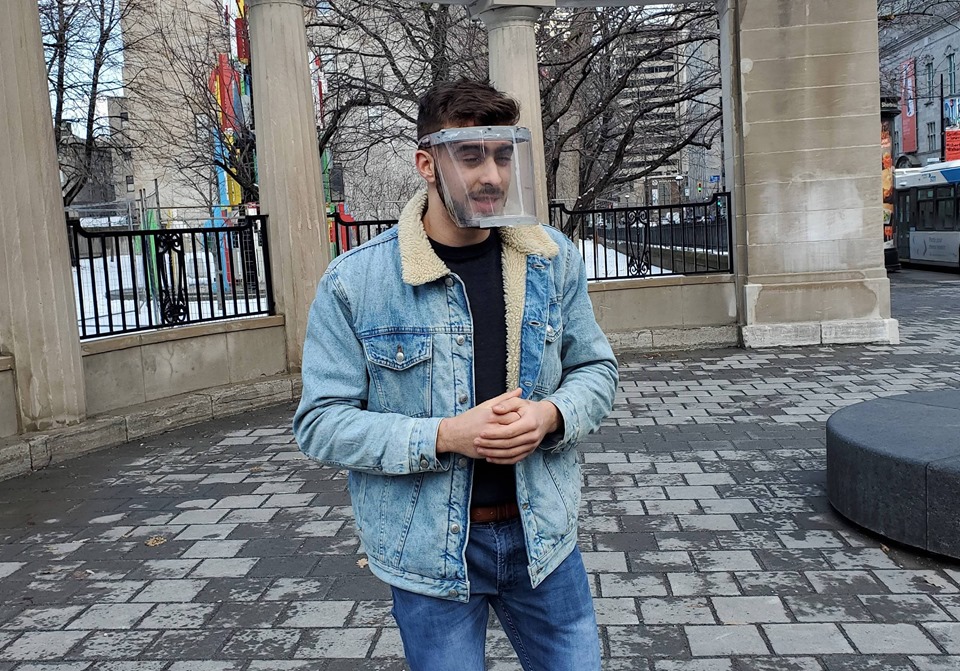Personal protective equipment (PPE) is essential for health care workers on the front line in the fight against COVID-19. As the number of global cases continues to increase, hospitals are experiencing shortages of basic medical equipment, most notably protective face shields, plastic guards that protect doctors and nurses from infectious material.
Panic buying in the early days of the COVID-19 outbreak made face masks a scarce resource. Since then, recent increases in hospitals’ demand for PPE has pushed the already fragile face shield supply chain to the brink of collapse. Face shields provide an important second line of defense for medical professionals, helping to extend the masks’ lifetime if they need to be reused.
A team of undergraduate students from McGill, Concordia, and Queen’s University have developed an innovative solution to address Montreal’s mask shortage. Using 3D printing technology and a free, open-source design for face shields, the students have started printing ready-to-use shields from their bedrooms.
Thomas Bâby, U1 Engineering, is one of the McGill students leading the initiative.
“Right now, after speaking with medical personnel at one Montreal hospital, we learned that they are in dire need of face shields,” Bâby said in an interview with The McGill Tribune. “We will need to distribute to more hospitals and clinics in Montreal [in order to meet demand].”
In just four days, the operation grew from producing only a few dozen face shields per day to well over 100, with the potential to increase production with support from local manufacturers. Already, the team of students has been in contact with automotive producers, who have agreed to lend printers and materials for the project.
Canada is not alone in its lack of PPE. Hospitals in other highly industrialized countries, such as the United States and Italy, have already started running out of masks, putting front line health care workers at a greater risk of infection.
The student-led team is not alone in their decision to take the production of vital medical equipment into their own hands. Earlier this month, an Italian engineering start-up began 3D printing respirator parts to address the absence of basic life-support equipment currently plaguing Italy’s hospitals.
Cyril Mani, U1 Engineering, expressed concerns unique to the Montreal team.
“We are limited by the quantity of material that we have access to,” Mani said. “We are a bunch of students. We don’t have financial backing from the people that decide to join us. If people can afford to help us make just one [visor], it is good enough, but to reach our goal of more than 200 [visors] per day, it becomes a question of where these materials will come from.”
Mani and his colleagues have set up a supply chain in collaboration with the McGill University Health Centre (MUHC), one of the many hospitals in Montreal that have received COVID-19 patients. All printed face shields are assembled by the team of students and disinfected under the supervision of medical professionals. Produced at a cost of less than $1 per unit, the students have managed to create a viable piece of PPE that is both safe and cost-effective, a feat of logistical prowess that many national governments are still struggling to achieve.
Still, Mani is asking private companies and the public to join forces to increase support for their initiative.
“We could be using [3D printers] to print, in real-time, the shields that will protect our nurses and our doctors and actually save lives,” Mani said. “We need the public libraries and private corporations that have access to these printers and materials to contact us. We have the supply chain ready. We can assemble it for them. We just need more people to be aware of what we are doing.”
For more information about how you can help, consult the project’s Google Drive resources. The team is looking for those with access to laser cutters or 3D printers, as well as manufactures who can supply raw materials. They also accept donations to help purchase materials and support production costs.







Bravo to all those involved, as your initiative will hopefully spark new innovations and opportunities in the community at large.
Thank you for our local heros!